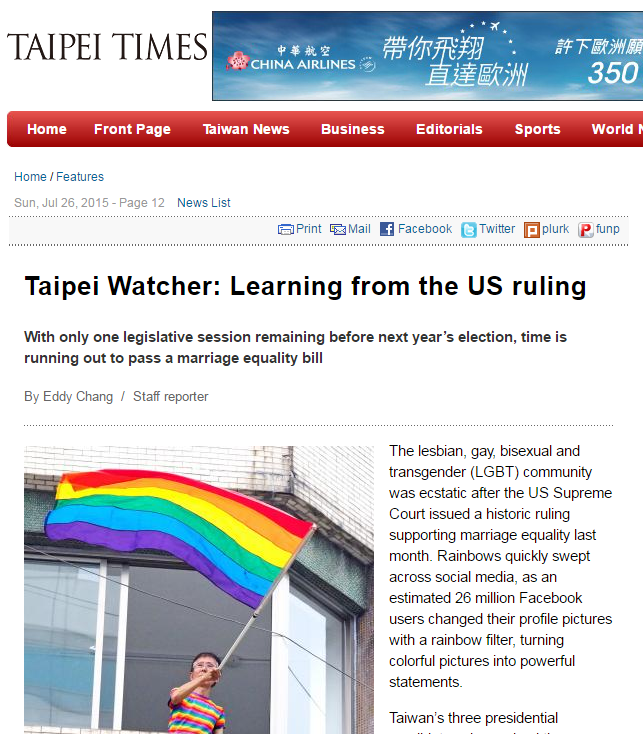Taipei Watcher: Learning from the US ruling
With only one legislative session remaining before next year’s election, time is running out to pass a marriage equality bill
By Eddy Chang / Staff reporter
The lesbian, gay, bisexual and transgender (LGBT) community was ecstatic after the US Supreme Court issued a historic ruling supporting marriage equality last month. Rainbows quickly swept across social media, as an estimated 26 million Facebook users changed their profile pictures with a rainbow filter, turning colorful pictures into powerful statements.
Taiwan’s three presidential candidates also praised the landmark ruling. Independent presidential candidate Shih Ming-te (施明德) expressed his full support, promising to legalize same-sex marriage if he is elected president next year, while Chinese Nationalist Party (KMT) presidential candidate Hung Hsiu-chu (洪秀柱) and Democratic Progressive Party (DPP) presidential candidate Tsai Ing-wen (蔡英文) didn’t make any concrete commitments.
“The ruling shows respect for differences in US society... With more dialogue and communication, true equality will come someday,” Hung said.
Tsai’s comment was almost identical, stressing that Taiwan should “reduce social division through rational dialogue.” Their statements were polite but vague.
GLOBAL IMPACT
The US Supreme Court’s decision had an immediate effect. Puerto Rico signed an executive order requiring government agencies to approve same-sex marriage within 15 days. In conservative Turkey, many LGBTs bravely stood out in downtown Istanbul to fight for equal rights, despite the police’s brutal attempt to clear the rally with water cannons, tear gas and dummy bullets. In India, Minister of Law and Justice DV Sadananda Gowda hinted that his country might scrap a law that criminalizes gay sex.
The Taiwan Alliance to Promote Civil Partnership Rights (TAPCPR, 伴侶盟), meanwhile, organized March: Let’s Walk to Marriage Equality (為婚姻平權而走), a rally that took place in Taipei on July 11. The alliance called on the KMT and DPP to amend the Civil Code (民法) for marriage equality and put it on the legislative agenda for review.
Thousands of protesters shouted “gay votes are also votes” as they marched between the Legislative Yuan and the headquarters of the two major parties. It was an emotional moment when gay rights pioneer Chi Chia-wei (祁家威) appeared at the march waving a rainbow flag. Chi launched Taiwan’s gay rights movement in 1986 when the court rejected his marriage to his same-sex partner.
The alliance originally planned to hold the rally on July 4, but postponed it out of sympathy for the victims of the inferno at New Taipei City’s Formosa Fun Coast (八仙樂園), in which nearly 500 people were injured or killed. It also raised money for the victims at the march.
PUNISHMENT FROM GOD?
Fundamentalist Christians, unsurprisingly, wasted no time linking the Formosa Fun Coast disaster with the US ruling.
“After the US legalized same-sex marriage, people changed their profile pictures to rainbow-colored on Facebook. Then the ‘color party’ burned like hell. The connection between them deserves further consideration,” Wang Kai-lun (王凱倫), a pastor at a Taichung church, wrote on his Facebook page.
Wang later told the Chinese-language Apple Daily that it was his “personal opinion,” not his church’s.
Before Wang deleted his controversial post, more than 100 netizens clicked the “like” buttom to show their support. One netizen even echoed Wang by claiming that, through the blaze, “God was showing his wrath to make his power known.”
發佈日期: 2015/07/26


轉
推
+1
寄